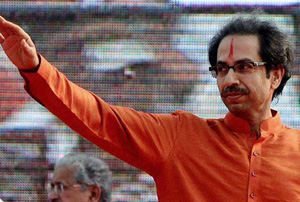New Delhi, Oct 9: A survey carried out in Maharashtra ahead of the October 15 Assembly elections has given BJP and allies 154 of the 288 seats, but Shiv Sena leader Uddhav Thackeray tops the popularity chart as chief ministerial candidate.
Incumbent Prithviraj Chavan is the second choice for chief minister though his party Congress is predicted to get an abysmally low 25 seats.
Percentage wise, BJP has been placed way ahead of its rivals by 36.50 per cent votes followed by 17.10 per cent of Shiv Sena and 11.97 per cent of Congress.
The survey conducted by 'The Week' and Hansa Research, paints a gloomy picture for Sharad Pawar's NCP, which is projected to get only 17 seats and 5.85 per cent votes.
Pawar is the fifth choice for the chief minister's post and stands behind MNS leader Raj Thackeray and BJP's Devendra Fadnavis.
Shiv Sena is predicted to be the second largest party after BJP with 47 seats, while Maharashtra Navnirman Sena, according to the survey, is likely to get 10 seats. MNS is predicted to get 5.11 per cent votes.
The survey has given 20 seats to Independents with 4.71 per cent votes and 15 to other parties with 6.79 per cent votes.
After 15 years of running coalition government in Maharashtra, Congress and NCP have parted ways and BJP-Shiv Sena's old alliance has also fallen apart paving the way for a five-cornered contest, with MNS being the fifth player which has recently made noises favourable to Shiv Sena.
BJP is going to polls with smaller "Mahayuti" allies. It has worked out a seat-sharing deal with Mahadeo Jankar's Rashtriya Samaj Paksha, Raju Shetty's Swabhimani Shetkari Paksha, Shiv Sangram and RPI.
In the outgoing Assembly, Congress has 82 seats and its ally-turned-rival NCP 62. Shiv Sena and BJP have 45 and 47 seats respectively while Raj Thackeray's MNS has 12 seats.
Congress and NCP, and Shiv Sena and BJP had fought the last elections as allies but both alliances broke up recently.





Comments
Add new comment